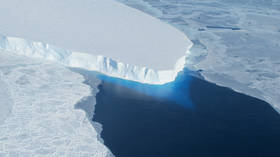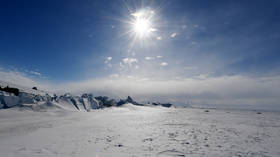‘Doomsday Glacier’ melting at alarming rate

A massive glacier in Antarctica, seen as crucial to the global sea level rise, could lose its ice shelf in “as little as five years,” a team of scientists has warned.
The Thwaites Glacier in western Antarctica is sometimes called the Doomsday Glacier because of its great potential to raise sea levels once melted. The glacier is about 74,000 square miles, which is roughly the size of Florida, according to CBS News.
A team of US scientists reported at an American Geophysical Union meeting this week that new cracks were forming on the eastern ice shelf, which supports one third of the glacier. The shelf, which “acts as a dam to slow the flow of ice off the continent into the ocean,” appears to be “losing its grip” due to warm water seeping under the glacier, researchers said, citing satellite images.
“If this floating ice shelf breaks apart, the Thwaites Glacier will accelerate, and its contribution to sea level rise will increase by as much as 25%,” the scientists wrote, adding that the shelf could be broken up in “as little as five years.”
According to the study, one of the fastest-melting glaciers in Antarctica is contributing as much as 4% of global annual sea level rise today, while the cracks are expanding into the central part of the ice shelf at rates as high as 2km (1.2 miles) per year.
“There is going to be dramatic change in the front of the glacier, probably in less than a decade. Both published and unpublished studies point in that direction,” geology professor Ted Scambos, US lead coordinator for the International Thwaites Glacier Collaboration, told the BBC on Tuesday.















